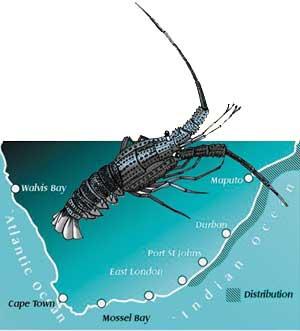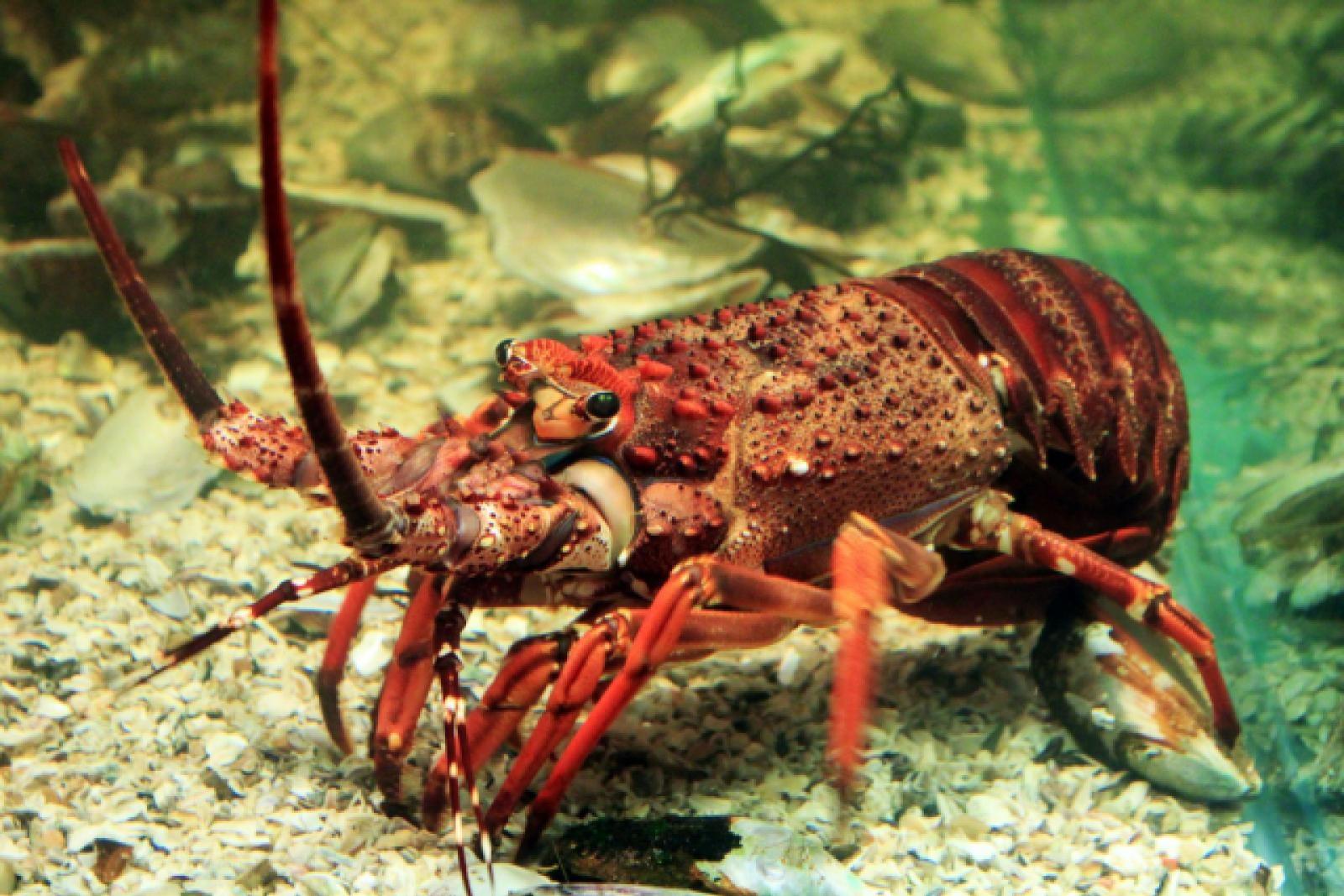Take a walk on the Wild side . . .
East Coast Rock lobster Crayfish. (Panulirus homarus)
UPDATE December 2023: You can get a recreational fishing/crayfish/mussel permits ONLINE. Go to https://www.fishing.dffe.gov.za/ords/r/epermit/permitwebapp/login and "create a new account".
IDENTIFICATION
Rock lobsters or spiny lobsters are popularly known as crayfish, but should be distinguished from the freshwater crayfish, which are considerably less popular in restaurants! Rock lobsters like crabs, belong to the crustacean family and have a horny exoskeleton (carapace) but they have a long tail ending with a tail fan. The East Coast rock lobster is brick red with orange spines and blue-green markings on the head.
There are two horns next to their eyes but unlike other species, there are no spines between these horns. The rock lobsters that may be sold in restaurants are either West Coast rock lobsters (Panulirus lalandii) or deep-water rock lobsters (Palinurus spp.) both have spines between their horns.
DISTRIBUTION
The East Coast rock lobster occurs from central Mozambique and Madagascar to East London. They inhabit rocky reefs in the surf zone at depths of 1-36 meters.
FEEDING
The most important prey of the East Coast rock lobster is the brown mussel <i>(Perna perna)</i>. They sever the byssus threads that hold the mussel and can crush the thin edge of the shell using their mouthparts. They also feed on limpets and will scavenge on the seabed.
GROWTH
Rock lobsters grow slowly, reaching sexual maturity after approximately 3 years when their carapace is 50-60 mm long. The legal size limit is 65 mm, to ensure that animals caught have had a chance to breed. If a rock lobster loses a leg or feeler, a new one is grown but then their overall growth is slower. It is therefore important not to damage undersize rock lobsters. Try to determine if an animal is the right size before attempting to catch it.
REPRODUCTION
Breeding occurs in summer and that is why we have a closed season from 1 November to the end of February: to protect the lobsters while they are brooding their eggs so these can hatch and replenish our stocks. Male rock lobsters place a packet of sperm on the underbelly of females. When the female is ready to lay eggs, she scratches open the packet to fertilise her eggs and then places them on the paddles (pleopods) under her tail. The eggs are tended there until they hatch. The larvae spend about five months in the currents out at sea and undergo metamorphosis 11 times before returning inshore. Larger female rock lobsters produce three times more eggs than smaller females.
FISHERY
In KwaZulu-Natal, rock lobsters may only be collected by permitted recreational harvesters. This sector collect 138 000 to 450 000 kg of rock lobster each year.
MANAGEMENT
The East Coast rock lobster stock is managed using a closed season, size limits, bag limits and gear limits. It is also illegal to possess any rock lobster carrying eggs.
With thanks to www.kznwildlife.co.za


Total views: 118,035 |

Comments
Grenville Clarke (not verified)
Wed, 15/02/2012 - 16:46
Permalink
crayfish
Grenville Clarke (not verified)
Wed, 15/02/2012 - 17:09
Permalink
Cray's
Bruce (not verified)
Wed, 15/02/2012 - 20:02
Permalink
Crays
petek (not verified)
Thu, 16/02/2012 - 14:19
Permalink
east coast rock lobster
Grenville Clarke (not verified)
Thu, 16/02/2012 - 14:37
Permalink
Cray's
petek (not verified)
Sat, 18/02/2012 - 22:39
Permalink
illegal fishing
Anonymous (not verified)
Mon, 05/03/2012 - 14:06
Permalink
Crays
Grenville (not verified)
Mon, 05/03/2012 - 19:18
Permalink
Diving 4 crays
cray diver (not verified)
Wed, 02/01/2013 - 10:15
Permalink
Yes - at thepost office the
craven (not verified)
Fri, 25/01/2013 - 12:29
Permalink
crayfish aroung east london
Add new comment